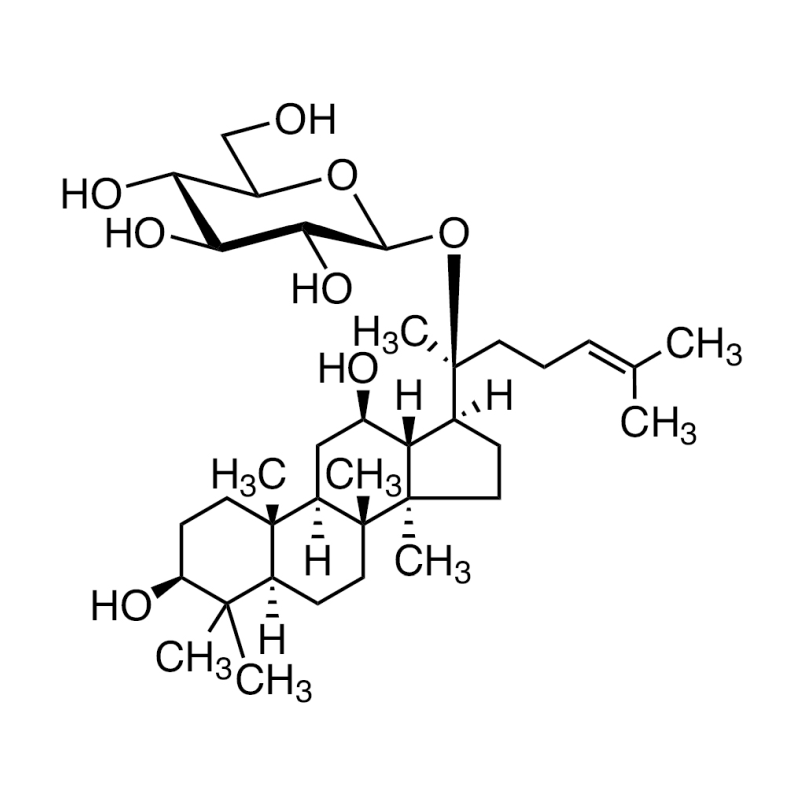产品
编 号:F345943
分子式:C36H62O8
分子量:622.87
分子式:C36H62O8
分子量:622.87
产品类型
规格
价格
是否有货
10mM*1mL in DMSO
询价
询价
1mg
询价
询价
5mg
询价
询价
10mg
询价
询价
结构图

CAS No: 39262-14-1
产品详情
生物活性:
Ginsenoside C-K, a bacterial metabolite of G-Rb1, exhibits anti-inflammatory effects by reducing iNOS and COX-2. Ginsenoside C-K exhibits an inhibition against the activity of CYP2C9 and CYP2A6 in human liver microsomes with IC50s of 32.0±3.6 μM and 63.6±4.2 μM, respectively.
体内研究:
The weight of the collagen-induced arthritis (CIA) mice increases slowly and is significantly less than that of the normal DBA/1 mice beginning on d 3 after injection of the emulsion. Ginsenoside C-K (28, 56, and 112 mg/kg) mice recover their weight by d 32 after the emulsion injection. Ginsenoside C-K (56 and 112 mg/kg) and Methotrexate (MTX)-treated (2 mg/kg) mice show significantly increased body weight on d 50 as compared with CIA mice. Hind paw-swelling began on d 24 post-immunization. CIA mice are treated from d 28 to d 50. Arthritis scores are measured every 4 d beginning on d 24. Ginsenoside C-K (56 and 112 mg/kg) significantly reduces the arthritis scores of the mice on d 51.
体外研究:
Ginsenoside C-K, a bacterial metabolite of G-Rb1, exhibits anti-inflammatory effects mainly by reducing inducible nitric oxide synthase (iNOS), cyclooxygenase (COX)-2, and proinflammatory cytokines. Ginsenoside C-K suppresses the expression of proinflammatory cytokines by downregulating the activities of IRAK-1, MAPKs, IKK-α, and NF-κB in LPS-treated murine peritoneal macrophages. Ginsenoside C-K also suppresses the expression of iNOS and COX-2 by inhibiting NF-κB signaling in LPS-stimulated RAW264.7 cells. In zymosan-treated bone-marrow-derived macrophages (BMDMs) and RAW264.7 cells, Ginsenoside C-K inhibits inflammatory responses by negatively regulating the secretion of proinflammatory cytokines, the activation of MAPKs, and the generation of ROS. In addition, anti-inflammatory activity of Ginsenoside C-K has been observed in LPS-stimulated microglial cells. Ginsenoside C-K hinders inflammatory responses by controlling both the generation of ROS and the activities of MAPKs, NF-κB, and AP-1. Ginsenoside C-K, a major metabolite of ginsenosides in the gastrointestinal tract, inhibits NF-κB signaling in a PXR-dependent manner. Ginsenoside C-K is shown to promote recovery of dextran sulfate sodium (DSS) -induced colitis by suppressing NF-κB activation. Ginsenoside C-K significantly reduces TNF-α-induced upregulation of IL-1β and iNOS mRNA levels, and restores the mRNA levels of PXR and CYP3A4 in LS174T cells. Ginsenoside C-K, one of the intestinal metabolites of 20(S)-protopanaxadiol derivatives, exhibits an inhibition against the activity of CYP2C9 in human liver microsomes with an IC50 value of 32.0±3.6 μM, a weak inhibition against the activity of CYP2A6 in human liver microsomes with an IC50 value of 63.6±4.2 μM, and an even weaker inhibition against the activity of CYP2D6 in human liver microsomes with an IC50 value of more than 100 μM.
Ginsenoside C-K, a bacterial metabolite of G-Rb1, exhibits anti-inflammatory effects by reducing iNOS and COX-2. Ginsenoside C-K exhibits an inhibition against the activity of CYP2C9 and CYP2A6 in human liver microsomes with IC50s of 32.0±3.6 μM and 63.6±4.2 μM, respectively.
体内研究:
The weight of the collagen-induced arthritis (CIA) mice increases slowly and is significantly less than that of the normal DBA/1 mice beginning on d 3 after injection of the emulsion. Ginsenoside C-K (28, 56, and 112 mg/kg) mice recover their weight by d 32 after the emulsion injection. Ginsenoside C-K (56 and 112 mg/kg) and Methotrexate (MTX)-treated (2 mg/kg) mice show significantly increased body weight on d 50 as compared with CIA mice. Hind paw-swelling began on d 24 post-immunization. CIA mice are treated from d 28 to d 50. Arthritis scores are measured every 4 d beginning on d 24. Ginsenoside C-K (56 and 112 mg/kg) significantly reduces the arthritis scores of the mice on d 51.
体外研究:
Ginsenoside C-K, a bacterial metabolite of G-Rb1, exhibits anti-inflammatory effects mainly by reducing inducible nitric oxide synthase (iNOS), cyclooxygenase (COX)-2, and proinflammatory cytokines. Ginsenoside C-K suppresses the expression of proinflammatory cytokines by downregulating the activities of IRAK-1, MAPKs, IKK-α, and NF-κB in LPS-treated murine peritoneal macrophages. Ginsenoside C-K also suppresses the expression of iNOS and COX-2 by inhibiting NF-κB signaling in LPS-stimulated RAW264.7 cells. In zymosan-treated bone-marrow-derived macrophages (BMDMs) and RAW264.7 cells, Ginsenoside C-K inhibits inflammatory responses by negatively regulating the secretion of proinflammatory cytokines, the activation of MAPKs, and the generation of ROS. In addition, anti-inflammatory activity of Ginsenoside C-K has been observed in LPS-stimulated microglial cells. Ginsenoside C-K hinders inflammatory responses by controlling both the generation of ROS and the activities of MAPKs, NF-κB, and AP-1. Ginsenoside C-K, a major metabolite of ginsenosides in the gastrointestinal tract, inhibits NF-κB signaling in a PXR-dependent manner. Ginsenoside C-K is shown to promote recovery of dextran sulfate sodium (DSS) -induced colitis by suppressing NF-κB activation. Ginsenoside C-K significantly reduces TNF-α-induced upregulation of IL-1β and iNOS mRNA levels, and restores the mRNA levels of PXR and CYP3A4 in LS174T cells. Ginsenoside C-K, one of the intestinal metabolites of 20(S)-protopanaxadiol derivatives, exhibits an inhibition against the activity of CYP2C9 in human liver microsomes with an IC50 value of 32.0±3.6 μM, a weak inhibition against the activity of CYP2A6 in human liver microsomes with an IC50 value of 63.6±4.2 μM, and an even weaker inhibition against the activity of CYP2D6 in human liver microsomes with an IC50 value of more than 100 μM.
产品资料

